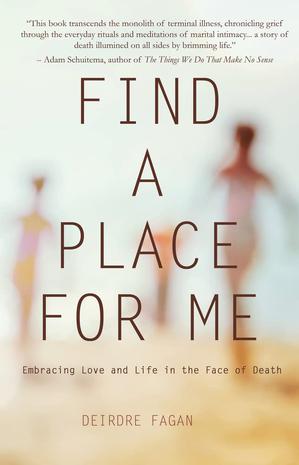
Find a Place for Me
Deirdre Fagan
Regal House Publishing, 2022
Review by Diane Gottlieb
“I have ALS.” These are the words Deirdre Fagan’s forty-three year-old husband spoke just days after Christmas 2011. Bob, the father of their children (who were then just three and eight years old), was going to die—soon. Amyotrophic Lateral Sclerosis, known by many as Lou Gehrig’s disease, is a neurological disorder that affects voluntary muscle movements. While the mind remains intact, the body becomes paralyzed. ALS is terminal. “There is no question whether you will die from ALS; there is only a when,” Fagan writes in Find a Place for Me, longlisted for Memoir Magazine’s 2022 Memoir Prize for Books. In this poignant memoir, Fagan chronicles her journey with Bob—from diagnosis, through his physical decline, to his death just ten months later.
Bob’s illness and passing were not Fagan’s first experiences with loss. Her eldest brother died of suicide when he was twenty-five, and her mother died of cancer at fifty-one. Fagan’s father and other brother also passed a few weeks apart, just five years before Bob’s diagnosis. Yet, it was Bob who taught Fagan her biggest lessons, not only about death but about life.
Bob was a philosopher by training, an important factor in how he approached his illness and death—practically and head-on, through a philosopher’s lens. Bob insisted on truth and would not tolerate sugar-coating—he pressed his doctors for his diagnosis and for information about what the progression of his disorder promised. He also made gut-wrenching decisions about how he was going to live out the remainder of his life—and how far he would go to prolong it. “Bob decided he didn’t want to be what he called ‘a watermelon on the counter’,” Fagan writes, “watching his life go by.”
While Bob was steadfast and analytical, Deirdre’s “way had always been more meandering, my heart often leading me in directions that my head knew I shouldn’t go.” Regardless of their different approaches, she and Bob were “committed to doing this thing—his death—together.” They did—they had the difficult conversations. And they laughed; dark humor got them through many days (these sections provide some lovely space for the reader to laugh as well).
Fagan’s writing is honest throughout—courageously and lovingly so. She talks openly about the couple’s sex life:
Bob and I had always had a healthy sex life, and we kept having one when we could. It was far more difficult now … It was easier on the make-shift queen size with a bed rail than it would be later in a single hospital bed, though; although with the hospital bed, there was a trapeze that would come in handy.
Fagan also talks about shit—literally; as Bob loses control of this function, Fagan discusses how that particular loss felt for both of them. She writes about financial challenges; challenges of space and inaccessibility; challenges of asking for—and accepting—help. In the midst of all this, Fagan also addresses fear, and writes through the pain of knowing that her young kids will lose their father, and she, her great love. Her writing is crisp, clear, and often strikingly beautiful:
When we lose someone from a terminal illness, we lose them one bit at a time…When someone’s skin is your own skin, losing them a bit at a time is fileting yourself one layer at a time…I could no longer deny that we were of two bodies, one ailing and one growing stronger in order to carry the other.
Fagan carried her husband, but Bob carried her as well. Maybe the most memorable example is his support of her finding another partner; the day after he received his diagnosis, Bob was already giving Fagan permission to find love again after he died. “I want you to find someone else after I’m gone,” he says. When the ALS had progressed significantly and their friend Dave stepped up to help them with daily chores, Bob would often hear Fagan and Dave speaking in the other room. He noticed how well they communicated with each other. “You two can really talk…you should pay attention to that,” he told his wife. When she jokingly asked if he was telling her to “hit on Dave,” Bob replied, “Well, we both know marriage is a long conversation…It’s not always easy to find someone you can talk to.”
The final chapter of the book is a short eulogy of sorts for Bob. In this section, Fagan’s skill as a wordsmith glows:
Bob spent the ten months of his diagnosis preparing those he loved to say goodbye to him. He did not spend his remaining time mourning his own death. Instead, he chose to spend his life celebrating life. When you find yourself on a train headed toward a wall, you can either collapse on the cushions or pour champagne. We chose to pour champagne and keep on pouring it, a response similar, I imagine, to the musicians who kept on playing as the Titanic sank.
Find a Place for Me is a powerful testament to love and to the strength of the human spirit. It is a brave work, unapologetic in raising difficult issues regarding illness and relationships—issues that are often pushed to the side. While I recommend having a box of tissues close by when you read Fagan’s memoir, I also suggest a pen and paper. You may want to take notes, as Find a Place for Me is a worthy primer both on how to approach one’s death and how to live in the moment.
Diane Gottlieb’s writing has appeared in Atlas and Alice, Bending Genres, 100-Word Story, The Rumpus, Hippocampus, and Entropy, among others, and has been anthologized in And If That Mockingbird Don’t Sing. She is the winner of Tiferet’s 2021Writing Contest in nonfiction and was the 2021 Dancing in the Rain fellow at the Writers’ Colony at Dairy Hollow. Diane is Prose/CNF Editor of Emerge Literary Journal. You can find her at https://dianegottlieb.com and on Twitter @DianeGotAuthor.